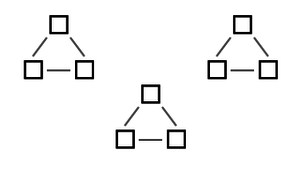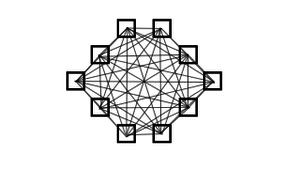Cybernetics Workshop Plan
About
I am currently planning a workshop that deals with the "cybernetic view of society" - essentially the post-World War II tendency to view society as a cybernetic entity whose behaviour can be managed and predicted through the use of mathematical systems. In my research last year, I proposed that this "cybernetic view of society" was an ideology born out of the complexity of Cold War politics, an attempt to regain some sense of control over the myriad of possible events that could tip the world into nuclear war.
In Steve Rushton's lecture at the Masters of Reality launch, he spoke about how American was transitioning from a manufacturing-based economy to an information economy. With cybernetics provided the underlying logic to the management of this transition, cybernetics left the military domain and began to form an integral part of the workings of civil society itself. Cybernetic concepts were assimilated into management systems in corporations, municipal and governmental strategy, visual art/music/film/literature, environmental science, and the mass media's understanding of the world. The result was the formation of what Jack Burnham calls a "systems-oriented culture, where change emanates not from things, but from the way things are done." source
The game Micropolis (the open source version of Sim City) encapsulates these ideas in the form of an interactive game, in which the goal is to build a metropolitan utopia in an empty virtual landscape while trying to manage municipal finances, keep the population happy, and strike a balance between the division of labour in the city. The game presents the player with a simplified set of rules and some starting capital, and from then on he/she must decide how the city is to function without much further prompt from the game, other than basic feedback about crime rate or public opinion of tax rates, for example. The game presents the player with an exaggerated "cybernetic view of society: the rules of the game are mutually dependent, affecting each other through feedback loops, recursion, and cellular automata-like systems. The result is an impression of a city inhabited by people (referred to as Sims) with jobs, homes, and opinions on how the city is being run.
My aim with this workshop is to open a debate with the participants about the "cybernetic view of society" and systems-oriented culture in general. I am curious to hear how people feel we have gained from this transition, and how we might be adversely affected. I see the workshops as serving two purposes: firstly, they are an end in themselves - they are designed to encourage the participants to draw new conclusions about the type of society we live in today, and question the necessity of the underlying systems, and if they contribute to a better way of life. Secondly, I hope that the workshops can function as "field-research", and that I can use some of the feedback I receive from these workshops to inform my practice. I see great value in avoiding an insular and individualistic approach to my research this year: the formation of micro-communities for the duration of the workshops are integral to a practical understanding of my research.
Workshop Structure
Overview
The workshop structure will operate best with 6-10 participants, and over the course of a 6 hour session split into 3 section. The first part will take the form of a lecture of about one hour followed by a brief Q&A session. The second section lasts approximately 2 hours, beginning with a brief introduction to the game Micropolis. The participants then play the game as a committee, making decisions together and trying to build a utopian metropolis. The final section takes the form of an open discussion about the first two sections of the workshop. Specifically, how the participants feel the lecture and the game relate to each other, and how both relate to their own experiences of 21st century society.
The workshop would require the following facilities:
- Table space for 6-10 participants
- Internet connection (ethernet for 6-10 participants, or wireless internet)
- If available, some computers (preferably with linux-based OS) which I could pre-install Micropolis on to save time.
- Projector/wall space or panel.
Section 1
Section 1 is loosely based on the format of the talk I gave at LiWoLi last May. The talk at LiWoLi traced the history of cybernetics during the Cold War, and how its theories were represented in a non-military context, specifically in popular cinema and television of the 1960s. I used various multimedia documents to support to ideas and to ground the discussion in tangible, practical examples of what can often be intimidating or overly-theoretical concepts.
This re-edited version is intended to be an introduction to cybernetics, detailing some of its fundamental concepts but mainly focusing on providing an overview with select examples of its cultural and political impact during from the 1940s until today. The course of discussion would will follow a selection of the below topics:
- Wiener's experiments with the Anti-Aircraft Predictor in the early 1940s
- Precognitive Systems: Using the War Sciences to Predict the Future
- Using Systems to Overcome a Crisis: The New Strategists and the Cuban Missile Crisis
- Operation Igloo White: The Cybernetic Jungle and Sensory Environments in South East Asia
- The Cybernetic Overseer: Project Cybersyn and Computers in Government
- The Communes and the Birth of The Countercultural Dream in Silicon Valley
- The Network Effect: How Cybernetics shapes Network Theory
- Social Feedback: How Critical Mass Drives Feedback Online
From this talk, the participants should have a good overview of cybernetics and its social influence over the last 70 years. Hopefully they would also have a novel and more interesting context with which they can begin exploring the game Micropolis.
Section 2
The second section of the game is centered around playing Micropolis. At this point, I'm unsure of how to organise the group. There are a number of scenarios I can work with:
Scenario 1
Allow the participants to play individually using their own computers. This approach focuses on them managing the internal system of Micropolis, making their own decisions to construct their own idea of a fully-functional city.
This approach follows a topology in which the nodes are independent of one another, and are not networked, as in the thumbnail image on the right. It is a non-social and autocratic model: each participant relies on their own skills to develop their city.
Scenario 2
Ask the participants to form committees of 2-3 people and start playing the game. In this instance, the participants have to manage two systems - the internal system of the game, and also the social system constructed around them. They have to make decisions about how the city should be built as a group, providing each other with feedback about how they feel they should progress in the game.
This topology takes the form of a group of mini-networks, within which the participants can make decisions and consult with other on how the game is to be played. There is no hierarchical bias built into the networks, but one may emerge through the course of playing the game. The participants can also decide how to delegate: they can assign particular tasks to each other, or propose a time-share system, etc.
Scenario 3
Play the game as one group, so that all decisions must be made by a large committee. This will increase the variety of the social system, and may cause the decision-making process to become increasingly complex. I would give the participants the opportunity to come up with their own hierarchical system to help manage this process.
This model is probably most closely related to the kind of social systems used in the communes in the 1970s. In attempting to create a "jeffersonian democracy", they used cybernetics and network theory to create non-hierarchical systems where any member of the group would have equal say in the workings of the commune. Feedback is most important in this scenario if the participants are to manage playing the game democratically. Alternatively, the group may decide to modify the network topology into a more hierarchical structure (either intentionally or by the natural development of a social order amongst the group) in order to better manage the system in Micropolis.



